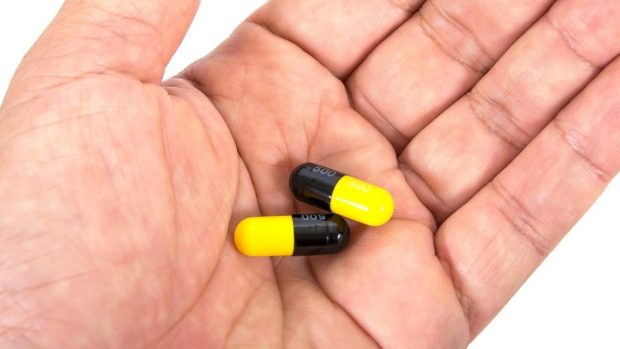
Antiviral tecovirimat found safe, effective for monkeypox treatment: Study
PTI, Aug 29, 2022, 3:57 PM IST

Representative Image (Credit: Getty Images)
Los Angeles: The antiviral tecovirimat appears to be safe and effective for the treatment of monkeypox symptoms and skin lesions, according to a small study. The study on 25 patients with monkeypox, published in the journal JAMA, is one of the earliest to assess and report the outcomes of treating patients with the disease with this antiviral.
Tecovirimat (TPOXX) is an antiviral drug for the treatment of smallpox. It limits viral spread in the body by inhibiting the work of the protein involved in the release of the enveloped virus.
Recently, the US Centers for Disease Control and Prevention (CDC) allowed physicians to prescribe tecovirimat on a compassionate use basis to treat adults and children with orthopoxvirus infections, including monkeypox.
”We have very limited clinical data on the use of tecovirimat for monkeypox infection. There is much to learn about the natural progression of the disease and how tecovirimat and other antivirals may affect it,” said study lead author Angel Desai, an adult infectious disease specialist at the University of California (UC) Davis.
The recent global outbreak of monkeypox has led to more than 45,500 cases as of August 22, 2022. While symptoms usually resolve on their own in 2-4 weeks, a recent study showed that 13 per cent of patients needed hospitalisation.
The new study included patients referred to UC Davis Medical Center, primarily through the Sacramento County Department of Public Health, between June 3 and August 13, 2022.
Patients with skin lesions in multiple body parts or in sensitive areas such as the face or genital region were offered oral tecovirimat treatment.
The treatment was weight-based, given every 8 or 12 hours, and was taken within 30 minutes of a high-fat meal.
The researchers collected clinical data at the first in-person evaluation for treatment and by in-person or telephone interview on day 7 and day 21 following the beginning of therapy.
In total, 25 patients with confirmed monkeypox infection completed a course of tecovirimat therapy. All were male. Their age ranged between 27 and 76 years. Nine patients had HIV. Only one patient had the smallpox vaccine, taken more than 25 years ago, and four others received a dose of JYNNEOS vaccination after symptoms started. JYNNEOS vaccine is approved in the US for the prevention of monkeypox disease in individuals 18 years of age and older at high risk for monkeypox infection.
The study found that 92 per cent of patients had lesions in their genital or anal area. While all patients had painful lesions, around half had fewer than 10 lesions over their entire body.
On average, the patients had symptoms or lesions for 12 days before they started their antiviral treatment. Fever was the most common symptom (76 per cent of the patients), followed by fatigue (32 per cent), sore throat (20 per cent) and chills (20 per cent).
Other symptoms included backache (12 per cent), muscle pain (8 per cent), nausea (4 per cent) and diarrhea (4 per cent). All patients completed the tecovirimat therapy and tolerated their treatment well.
They were treated for two weeks, except for one patient who was treated for 21 days. On day 7 of therapy, 40 per cent of patients had healed from their lesions. By day 21, 92 per cent had healed and were pain-free.
The most reported adverse events on day 7 of therapy included: fatigue (28 per cent), headache (20 per cent), nausea (16 per cent), itching (8 per cent) and diarrhea (8 per cent).
”We have to be very careful in how we interpret the data. It is hard to differentiate the side effects due to therapy from those caused by the infection,” said infectious diseases expert and co-author George Thompson.
The study was small and did not include a control group. So, assessing antiviral efficacy in terms of symptom duration and severity was limited, the researchers said. The time from symptom onset to starting the antiviral therapy varied among the patients, they said.
The researchers call for large-scale studies to explore antiviral efficacy dosing and adverse events.
Udayavani is now on Telegram. Click here to join our channel and stay updated with the latest news.
Top News

Related Articles More

High nitrate levels in groundwater threaten public health in 440 districts: Report

Gujarat IMA opposes ‘mixopathy’ proposal; says it poses ‘severe risks’ to people’s health

Study links social inequality to dementia-related changes in brain
People single all their lives might have low life satisfaction: Study

Drinking tea, coffee linked to lower risk of head and neck cancer: Study
MUST WATCH
Latest Additions

‘Medical seats can’t remain vacant’: SC asks Centre to hold talks with stakeholders

World”s ”fastest violinist” will be in ”conversation” with L Subramaniam in Bengaluru on Jan 4

Gadag: Engineer dies by suicide in lodge

5-year-old girl raped by minor boy in UP
Bantwal: Boatman goes missing in Netravati River; search operations underway
Thanks for visiting Udayavani
You seem to have an Ad Blocker on.
To continue reading, please turn it off or whitelist Udayavani.





















